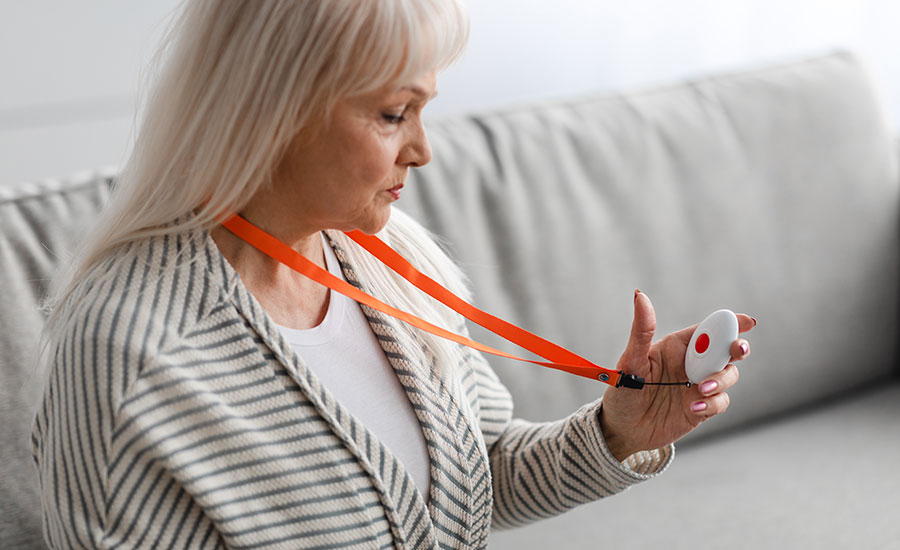
Could you or a loved one benefit from a Personal Emergency Response System (PERS). A PERS is an electronic device designed to allow people with disabilities or older people living alone to summon help in an emergency.
People use Personal Emergency Response System (PERS) for various reasons, such as general concerns about falling, needing reminders about when to take medications, or to allow loved ones or caregivers to run errands or go out for a while without worry. Others, like John, may have medical conditions that affect their ability to be alone and still be able to call for assistance.
John had in-home care nearly all the time, but his caregiver had taken a quick trip to the pharmacy to pick up his medications. Suddenly, he needed help, but found himself all alone. He hadn’t been in this position for as long as he could remember and he was frightened by his feelings of fear and helplessness.
Thanks to a Personal Emergency Response System (PERS), John was able to call for help that responded in just seconds. Once he pressed the button he wore around his neck, remote call answering began communicating with John without him ever having to get to the phone.
The call for help was received at a centrally monitored response center, where trained response associates have complete access to John’s personal profile and critical information. They quickly found out why John needed help and took action.
The response center can assess the situation and get help from a close neighbor or family member, or an ambulance, fire, or police department, when needed. If John had been unable to indicate his needs, emergency help would have been dispatched immediately.
Not only do Personal Emergency Response System (PERS) provide peace of mind to the person with limited physical abilities, but caregivers can also feel secure in knowing that their friend or family member is well cared for. Continuous caregiving can lead to exhaustion, putting the friend or family member at risk. Having reliable help just seconds away is a comfort to everyone.
Aside from the two-way voice communicator, a selection of specially designed assistive devices can be used with a Personal Emergency Response System (PERS) to give individuals with neuromuscular disabilities the ability to call for help. An assessment by an occupational or physical therapist may be needed to determine which assistive device would be most appropriate.
Examples of Assistive Devices Include:
- Pillow Switch that can be pinned to a pillow and activated by a controlled head movement.
- Wobble Switch that can be activated by gross body or head movements coming from any direction.
- Rocker Lever Switch that is activated by gross hand, arm or body movements or by a mouth or head stick.
- Sip or Puff Switch that is activated by sipping or puffing on a tube depending on availability of breath control or respiratory control.
- P-Switch, which is activated by minimal movement, detected by small sensors (set by the user) and can be placed on any part of the body capable of minimal motion.
There are a variety of Personal Emergency Response System (PERS) available. Many charge a monthly fee and a one-time set-up fee. Others require you to sign a three-month, six-month or year-long-lease, while others offer rental opportunities. To navigate the maze of PERS, the Federal Trade Commission (FTC) offers the following suggestions:
- Check out several systems before making a decision.
- Find out if you can use the system with other response centers. For example, can you use the same system if you move?
- Ask about the pricing, features, and servicing of each system and compare costs.
- Make sure the system is easy to use.
- Test the system to make sure it works from every point in and around your home. Make sure nothing interferes with transmissions.
- Read your purchase, rental, or lease agreement carefully before signing.
Questions to Ask the Response Center
- Is the monitoring center available 24 hours a day, 7 days a week?
- What is the average response time?
- What kind of training does the center staff receive?
- What procedures does the center use to test systems in your home? How often are tests conducted?
The FTC works for the consumer to prevent fraudulent, deceptive and unfair business practices in the marketplace and to provide information to help consumers spot, stop and avoid them. Visit www.ftc.gov/ftc/consumer.htm for free information on consumer issues. Also visit www.ftc.gov or call toll-free, 1-877-FTC-HELP (1-877-382-4357); TTY: 1-866-653-4261.
Provided by: Phillips Lifeline
For more information: www.usa.philips.com
Copyright © 2008 RetirementConnection.com. All rights reserved.

